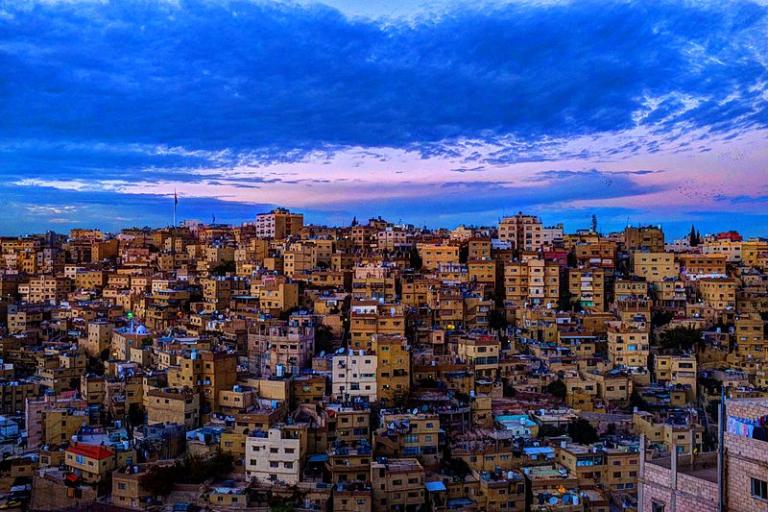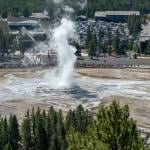
The Jordanian ambassador to the United States of America, Dina Kawar, is in Utah right now. She lectured yesterday afternoon at BYU, and my wife and I enjoyed a dinner with her last night, hosted by Elder Larry Lawrence of the Seventy and his wife in the Joseph Smith Memorial Building (JSMB) across from Temple Square. There were twelve of us in total, including a counselor in the Primary general presidency and her spouse, as well as a security person.
It was an interesting evening, for various reasons. General Conference begins tomorrow, and the JSMB was full of General Authorities and assembled Area Authorities. The various quorums of the Seventy, most of which meet together only occasionally, had dinners throughout the building. We met several General Authorities whom I know. (I regret that I won’t be seeing my longtime friend Elder Bruce Porter; we were planning to get together during this conference season.) The very first person whom my wife and I met (and chatted with) as we entered the building was Elder Patrick Kearon, whose remarkable April 2016 General Conference address on the refugee problem still stands out as one of my great lifetime Conference moments. (See this moving YouTube excerpt from it.) Another of those great moments was President Dieter F. Uchtdorf’s emotional response to Elder Kearon’s address, which you can see here, beginning at 2:20. He is a German, not given to great displays of public emotion, and he was clearly struggling not to lose control as he conducted that session of Conference, but his reaction becomes comprehensible when we realize that, as a child, he himself was a refugee, caught up in the destruction of World War Two, fleeing before the advance of the Soviet army, escaping Communist oppression in East Germany. This is explained, briefly, in the same video, starting at 4:25 following the excerpt from Elder Kearon’s speech and his response.)
Ambassador Kawar — a Greek Orthodox Christian, by the way — has had a stellar diplomatic career, including twelve years as Jordan’s ambassador to France (during which time she also served as her nation’s nonresident ambassador to Portugal and to the Holy See, the Vatican). Subsequently, she was appointed ambassador to the United Nations, at a point when Jordan was slated to be among the non-permanent members of the Security Council; she became the first Arab woman to preside over that highest of UN bodies. She became Jordan’s chief diplomat in Washington DC during September 2016, and she now finds herself living on the same paparazzi-infested block as Secretary of State Rex Tillerson, Jared and Ivanka Trump, and Barack and Michelle Obama.
Anyway, talking with Elder Kearson was entirely appropriate, since the refugee crisis in the Middle East was a significant theme, also, of Ambassador Kawar’s remarks at BYU yesterday afternoon and in our conversation over dinner last night.
According to one account (from Amnesty International), ten countries (out of the world’s 193 countries) are hosting about 56% of the world’s refugees, although those ten countries account for only about 2.5% of the world economy.
Some people — including a number of fierce critics of Islam — have pointed out with some justification that oil-rich Arab Muslim nations such as Kuwait and Saudi Arabia seem to be contributing relatively little assistance to refugees. The anti-Muslims see this as yet another indictment against Islam.
As always, however, the truth isn’t quite that neat. Jordan, a Muslim state that has taken in over 2.7 million people, was named the top refugee-hosting country by Amnesty International. Its own native population stands at roughly 6.5 million. Precise numbers are a bit hard to come by, and definitions vary. By any standard, though, the problem is a huge one, and Jordan is carrying a disproportionately heavy load. As Ambassador Kawar put it, using slightly different figures, it’s as if the population of Canada were to double — and then to flee, without any possessions, southward to the United States.
Jordan is straining to cope with the influx. Ninety percent of the refugees have moved into Jordanian cities. Ten percent are in camps. Elder and Sister Lawrence had just visited a Jordanian refugee camp two weeks ago; it had 100,000 residents. (He is a physician, so he paid close attention, naturally, to the health situation there.) In Jordan, the second most arid nation on Earth, managing the problem of adequate drinking water alone is a major challenge. Schools and teachers are running double shifts, with class sizes of 45-50. United Nations studies indicate that refugees tend to remain displaced, on average, for an average of seventeen years. The Syrian civil war is about seven years old; that suggests, if the average holds in this case, that Jordan still has something like a decade to go in dealing with this crisis.
Jordan, says Amnesty International, is followed by the overwhelmingly Muslim state of Turkey, with over 2.5 million refugees. Then come almost-100%-Muslim Pakistan, with 1.6 million, and mostly-Muslim Lebanon, which hosts over 1.5 million people. Other countries on the list include the Islamic Republic of Iran, Ethiopia, Kenya, Uganda, the Democratic Republic of Congo and Chad.
By contrast, said Amnesty International, the world’s wealthiest countries “host the fewest and do the least.”
Here’s a link to the “I Was a Stranger” campaign launched and coordinated by the Church of Jesus Christ of Latter-day Saints.












